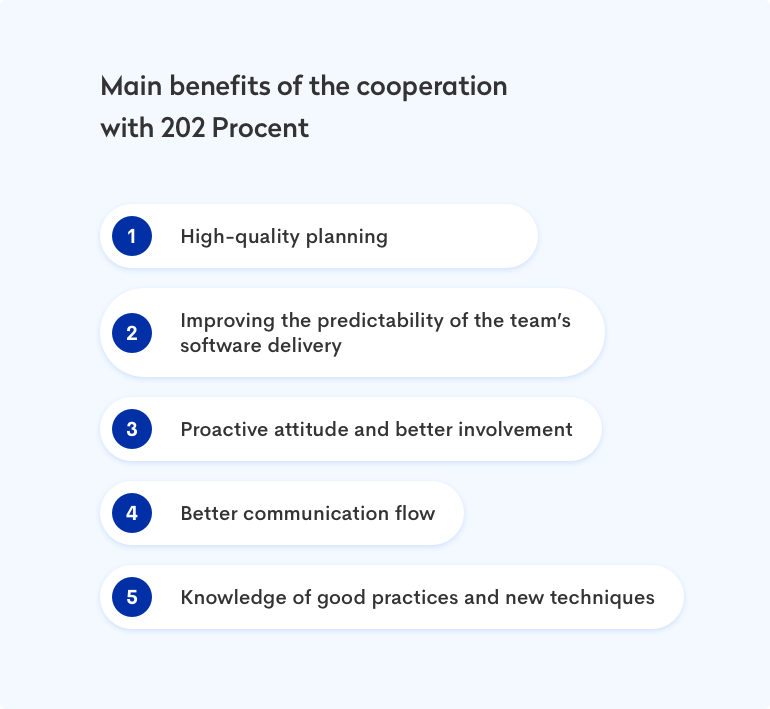In every project, it’s always worth stopping for a moment and analyzing the effectiveness of the work from a wider perspective. Although we at Blurify maintain an Agile mindset and our work is put through a well-thought-out process, there’s always room for improvement. We were recently reminded of this when we faced some key challenges in one of our largest projects. In order to deal with them and enhance the way we work, we decided to start a cooperation with the consulting and training company 202 Procent.
Are you curious about how these experienced Agile practitioners took us under their wings, how it impacted the project in question and what lessons we learned? In this article, I will explain the process and share with you our best takeaways, which increased our effectiveness and helped us deal with the challenges in this one specific project.
202 Procent x Blurify in a nutshell
Let’s start with a few words about our work with 202 Procent. Since the challenges we experienced were specific to one of our largest projects, we focused closely on its needs. One of our main goals was to improve the predictability of the team’s software delivery in this case. To be precise, we focused on making improvements to the process planning and gathering of all necessary project requirements. As we work towards achieving better results every day, this cooperation was a great opportunity to upgrade our skills, come up with new conclusions, and excel in our project management practices.
We focused on identifying the biggest challenges we were facing and came up with ideas for how to achieve desirable results. The program was run by an experienced Agile practitioner, Jacek Wieczorek, who shared his expertise during our 3-month-long cooperation. In order to achieve our goals, we focused mostly on:
- Implementing specific techniques to improve predictability,
- Conducting controlled experiments,
- Sharing feedback,
- Spot-on workshop sessions.
What did our sessions look like in practice? In the beginning, each team member participated in an individual meeting with Jacek Wieczorek. Then we moved to regular meetings twice a month, and as we achieved more and more satisfying results, we reduced their frequency. Cooperation in this form turned out to be extremely valuable. Regular brainstorming sessions, useful exercises, and detailed analysis helped us generate ideas for better work management. So what exactly did we improve? Read on.
The main benefits of the cooperation
- High-quality planning and improving the predictability of the team’s software delivery up to almost 40%
The cooperation was crafted to our needs and helped us overcome most of the challenges perfectly. One of the most significant benefits we noticed right away is an improved work planning process and the ability to spot issues before they arise. First of all, we precisely plan all the activities in the sprint. Secondly, we carefully analyze the entire process and spot all of the factors which could be the source of a problem.
This wouldn’t be possible without thoroughly analyzing metrics and intensive work with available data. During the workshops, we regularly analyzed our statistics and managed to draw new, better conclusions. We also held discussions during our meetings.
As I mentioned before, we focused on one specific project as a response to some challenges we experienced. Our team was trying to figure out why our data was different than expected, and it led us to find possible mistakes in the whole process. What’s more, we collected inspiring ideas on how to avoid potential delays in complex projects.
What are we currently doing to maintain satisfactory results?
- We constantly analyze our metrics to make the right decisions based on the data;
- We have reduced the work in progress;
- We focus on completing as many of the chosen tasks as possible, so when someone from the team has finished their own tasks, they begin helping others;
- We use the visual planning technique to check where the ticks overlap and how to plan them;
- We do not plan far into the future and mostly focus on the next sprint, but we always keep in mind the entire project and its goals.
- Enhanced proactive attitude and better involvement
Meetings with Jacek were a great opportunity to share our own ideas and get involved in discussions. At Blurify, we are always open to different points of view and encourage everyone to take part in the dialogue. Although our team members mostly stay active during the meetings, sometimes it gets more challenging in the big projects, with more people involved.
In the workshops, we had many occasions to talk and be proactive. It had a positive impact on the whole team so that all members felt confident in proposing their own solutions and sharing regular feedback. To stay efficient, the Agile team needs to communicate smoothly, share a common vision, and follow all the rules together. We succeeded in all those points!
- Better communication flow in the team
Another lesson we learned was how to improve our communication flow and better identify issues before they arise. Jacek helped us to understand at what points we were failing, plus acquire skills that allow us to better spot emerging problems. We care about having open conversations and solving all difficulties – it helps us react faster to challenges, face them, and thus push the project forward.
We also learned what to pay attention to in order to make the process more effective. Now, if the work goes in a different direction than previously agreed, we always discuss the topic quickly to avoid unnecessary chaos. In the workshops, we all discussed what methods we should implement to better manage tasks and what we can use based on previous experiences.
4. Knowledge of good practices and openness to new solutions
The workshops provided us with useful knowledge of effective Agile practices and many techniques and mechanisms that will be beneficial in future projects. Gaining new knowledge and applying new methods opens up horizons and upgrades our skills. It helps us take on new challenges, develop ourselves and – most important – deliver value for our clients.
Wrapping up
To sum up, we have found the cooperation with 202 Procent very valuable. We have not only developed our skills and increased our quality of work, but also started more constructive discussions among the team.
We are definitely more insightful now, and we know what signals should draw our attention to reach our goals. We improved the performance in our largest project and learned how to prevent similar problems in the future. Large projects need a slightly different approach to move them forward, and analyzing all the processes deeply lets us draw key conclusions. Through this partnership, we have increased our efficiency, improved the team’s flow, identified bottlenecks in the project, and achieved great results.




